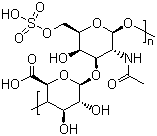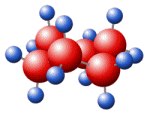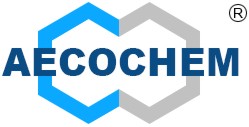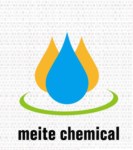|
Suppliers for CAS
9007-28-7
|
Properties | | CAS |
9007-28-7 | | Formula |
(C14H21NO14S)n | | EINECS |
232-696-9 |

|
|
46 Registered suppliers
Simagchem Corporation
P.R.China
Aecochem Corp.
P.R.China
Dayang Chem (Hangzhou) Co.,Ltd.
P.R.China
Sancai Industry Co.,Ltd.
P.R.China
| Appearance | White to Off-white Free Flowing Powder
| | Clarity and Color of Solution | 0.35 Max at 420nm
| | Specific Rotation | -20.0 — -30.0
| | Chondroitin Sulfate Assay (CPC) | 90% Min ( O.D.B)
| | Loss On Drying | 10% Max
| | PH | 5.5-7.5
| | Particle size | 100%through 80mesh
| | Content of Protein | 6.0% Max (Dried Basis)
| | Residue On Ignition | 20%-30%
| | Heavy Metals (Pb) | 20PPM Max
| | Total Plate Count | 1,000cfu/g Max
| | Yeast & Mold | 100cfu/g Max
| | E.Coli | Negative
| | Salmonella | Negative
| | Clostridium | Negative |
Hangzhou Keying Chem Co., Ltd.
P.R.China
| Appearance | White to Off-white Free Flowing Powder
| | Clarity and Color of Solution | 0.35 Max at 420nm
| | Specific Rotation | -20.0 — -30.0
| | Chondroitin Sulfate Assay (CPC) | 90% Min ( O.D.B)
| | Loss On Drying | 10% Max
| | PH | 5.5-7.5
| | Particle size | 100%through 80mesh
| | Content of Protein | 6.0% Max (Dried Basis)
| | Residue On Ignition | 20%-30%
| | Heavy Metals (Pb) | 20PPM Max
| | Total Plate Count | 1,000cfu/g Max
| | Yeast & Mold | 100cfu/g Max
| | E.Coli | Negative
| | Salmonella | Negative
| | Clostridium | Negative |
H&Z Industry Co.,Ltd
P.R.China
| Appearance | White to Off-white Free Flowing Powder
| | Clarity and Color of Solution | 0.35 Max at 420nm
| | Specific Rotation | -20.0 — -30.0
| | Chondroitin Sulfate Assay (CPC) | 90% Min ( O.D.B)
| | Loss On Drying | 10% Max
| | PH | 5.5-7.5
| | Particle size | 100%through 80mesh
| | Content of Protein | 6.0% Max (Dried Basis)
| | Residue On Ignition | 20%-30%
| | Heavy Metals (Pb) | 20PPM Max
| | Total Plate Count | 1,000cfu/g Max
| | Yeast & Mold | 100cfu/g Max
| | E.Coli | Negative
| | Salmonella | Negative
| | Clostridium | Negative |
Xingrui Industry Co., Limited
P.R.China
| Appearance | White to Off-white Free Flowing Powder
| | Clarity and Color of Solution | 0.35 Max at 420nm
| | Specific Rotation | -20.0 — -30.0
| | Chondroitin Sulfate Assay (CPC) | 90% Min ( O.D.B)
| | Loss On Drying | 10% Max
| | PH | 5.5-7.5
| | Particle size | 100%through 80mesh
| | Content of Protein | 6.0% Max (Dried Basis)
| | Residue On Ignition | 20%-30%
| | Heavy Metals (Pb) | 20PPM Max
| | Total Plate Count | 1,000cfu/g Max
| | Yeast & Mold | 100cfu/g Max
| | E.Coli | Negative
| | Salmonella | Negative
| | Clostridium | Negative |
Hangzhou Meite Industry Co., Ltd (Hangzhou Meite Chemical Co., Ltd)
P.R.China
| Appearance | White to Off-white Free Flowing Powder
| | Clarity and Color of Solution | 0.35 Max at 420nm
| | Specific Rotation | -20.0 — -30.0
| | Chondroitin Sulfate Assay (CPC) | 90% Min ( O.D.B)
| | Loss On Drying | 10% Max
| | PH | 5.5-7.5
| | Particle size | 100%through 80mesh
| | Content of Protein | 6.0% Max (Dried Basis)
| | Residue On Ignition | 20%-30%
| | Heavy Metals (Pb) | 20PPM Max
| | Total Plate Count | 1,000cfu/g Max
| | Yeast & Mold | 100cfu/g Max
| | E.Coli | Negative
| | Salmonella | Negative
| | Clostridium | Negative |
Leap Chem Co., Ltd
P.R.China
Molecular Formula: C13H21NO15S Molecular Weight: 463.36854 HS Code: 39139000
More details are to be found here
Tianjin Norland Biotech Co., Ltd.
P.R.China
Molecular Formula: C13H21NO15S Molecular Weight: 463.36854 HS Code: 39139000
More details are to be found here
Wuhan Soleado Technology Co., Ltd.
P.R.China
Kraeber & Co GmbH
Germany
Hädener Rohstoffe GmbH
Switzerland
ICC Chemical Corporation
USA
Beckmann-Kenko GmbH
Germany
New Natural Biotechnology Co.,Ltd.
P.R.China
VMP Chemiekontor GmbH
Germany
AXO Industry SA
Belgium
Arakato Development Ltd
Hong Kong
Refine Chemical Co.,Ltd.
P.R.China
FUDAW INDUSTRY LTD
P.R.China
Wuhan PharmChem Co., LTD.
P.R.China
EINECS :232-696-9
Molecular formula :C13H21NO15S
OPQ Chemical Co., Ltd
P.R.China
EINECS :232-696-9
Molecular formula :C13H21NO15S
XD BIOCHEMS Ltd
P.R.China
EINECS :232-696-9
Molecular formula :C13H21NO15S
Hangzhou Zhongqi Chem Co., Ltd
P.R.China
EINECS :232-696-9
Molecular formula :C13H21NO15S
Nantong Xindao Biotech Ltd
P.R.China
EINECS :232-696-9
Molecular formula :C13H21NO15S
EINECS :232-696-9
Molecular formula :C13H21NO15S
Lori Industry Co., Ltd
P.R.China
EINECS :232-696-9
Molecular formula :C13H21NO15S
Zehao Industry Co., Ltd.
P.R.China
EINECS :232-696-9
Molecular formula :C13H21NO15S
Shandong SanYoung Industry Co., Ltd
P.R.China
EINECS :232-696-9
Molecular formula :C13H21NO15S
Xiamen Equation Chemical Co.,Ltd
P.R.China
EINECS :232-696-9
Molecular formula :C13H21NO15S
AK Scientific, Inc.
USA
EINECS :232-696-9
Molecular formula :C13H21NO15S
Chemos GmbH & Co. KG
Germany
EINECS :232-696-9
Molecular formula :C13H21NO15S
BuGuCh & Partners
Germany
EINECS :232-696-9
Molecular formula :C13H21NO15S
Xi´an SR Bio-Engineering Co., Ltd.
P.R.China
Category: mucopolysaccharides, chondroitin sulfate sodium salt is the most common and the most widely used.
Chemical nature
The unsaturated sugars produced by CS under acidic, alkaline and enzymatic hydrolysis conditions, including low-molecular-weight CS and CS oligosaccharides or disaccharides, are all related to β-elimination reactions.
The degradation degree of CS under acidic, alkaline, and neutral conditions is expressed by the UV absorbance value at 232nm. The larger the UV absorbance value, the greater the degradation degree, which reflects the stability of CS under different conditions.
Physical properties
CS is an acidic mucopolysaccharide substance extracted from animal tissues. It is a white or off-white powder; it is odorless; it has hygroscopic properties. The aqueous solution of this product is viscous and does not condense when heated. This product is easily soluble in water, but insoluble in organic solvents such as ethanol, acetone, and ether. Its salts are relatively stable to heat and will not be destroyed when heated to 80°C. Chondroitin sulfate aqueous solution is unstable when exposed to higher temperature or acid, and is mainly deacetylated or degraded into monosaccharides or polysaccharides with smaller molecular weight.
Luck Herb Biotechnology Co., Ltd
P.R.China
Category: mucopolysaccharides, chondroitin sulfate sodium salt is the most common and the most widely used.
Chemical nature
The unsaturated sugars produced by CS under acidic, alkaline and enzymatic hydrolysis conditions, including low-molecular-weight CS and CS oligosaccharides or disaccharides, are all related to β-elimination reactions.
The degradation degree of CS under acidic, alkaline, and neutral conditions is expressed by the UV absorbance value at 232nm. The larger the UV absorbance value, the greater the degradation degree, which reflects the stability of CS under different conditions.
Physical properties
CS is an acidic mucopolysaccharide substance extracted from animal tissues. It is a white or off-white powder; it is odorless; it has hygroscopic properties. The aqueous solution of this product is viscous and does not condense when heated. This product is easily soluble in water, but insoluble in organic solvents such as ethanol, acetone, and ether. Its salts are relatively stable to heat and will not be destroyed when heated to 80°C. Chondroitin sulfate aqueous solution is unstable when exposed to higher temperature or acid, and is mainly deacetylated or degraded into monosaccharides or polysaccharides with smaller molecular weight.
American Laboratories, Inc.
USA
Category: mucopolysaccharides, chondroitin sulfate sodium salt is the most common and the most widely used.
Chemical nature
The unsaturated sugars produced by CS under acidic, alkaline and enzymatic hydrolysis conditions, including low-molecular-weight CS and CS oligosaccharides or disaccharides, are all related to β-elimination reactions.
The degradation degree of CS under acidic, alkaline, and neutral conditions is expressed by the UV absorbance value at 232nm. The larger the UV absorbance value, the greater the degradation degree, which reflects the stability of CS under different conditions.
Physical properties
CS is an acidic mucopolysaccharide substance extracted from animal tissues. It is a white or off-white powder; it is odorless; it has hygroscopic properties. The aqueous solution of this product is viscous and does not condense when heated. This product is easily soluble in water, but insoluble in organic solvents such as ethanol, acetone, and ether. Its salts are relatively stable to heat and will not be destroyed when heated to 80°C. Chondroitin sulfate aqueous solution is unstable when exposed to higher temperature or acid, and is mainly deacetylated or degraded into monosaccharides or polysaccharides with smaller molecular weight.
Paul Schueller International Inc.
USA
Category: mucopolysaccharides, chondroitin sulfate sodium salt is the most common and the most widely used.
Chemical nature
The unsaturated sugars produced by CS under acidic, alkaline and enzymatic hydrolysis conditions, including low-molecular-weight CS and CS oligosaccharides or disaccharides, are all related to β-elimination reactions.
The degradation degree of CS under acidic, alkaline, and neutral conditions is expressed by the UV absorbance value at 232nm. The larger the UV absorbance value, the greater the degradation degree, which reflects the stability of CS under different conditions.
Physical properties
CS is an acidic mucopolysaccharide substance extracted from animal tissues. It is a white or off-white powder; it is odorless; it has hygroscopic properties. The aqueous solution of this product is viscous and does not condense when heated. This product is easily soluble in water, but insoluble in organic solvents such as ethanol, acetone, and ether. Its salts are relatively stable to heat and will not be destroyed when heated to 80°C. Chondroitin sulfate aqueous solution is unstable when exposed to higher temperature or acid, and is mainly deacetylated or degraded into monosaccharides or polysaccharides with smaller molecular weight.
Pharmore Ingredients, Inc.
USA
Category: mucopolysaccharides, chondroitin sulfate sodium salt is the most common and the most widely used.
Chemical nature
The unsaturated sugars produced by CS under acidic, alkaline and enzymatic hydrolysis conditions, including low-molecular-weight CS and CS oligosaccharides or disaccharides, are all related to β-elimination reactions.
The degradation degree of CS under acidic, alkaline, and neutral conditions is expressed by the UV absorbance value at 232nm. The larger the UV absorbance value, the greater the degradation degree, which reflects the stability of CS under different conditions.
Physical properties
CS is an acidic mucopolysaccharide substance extracted from animal tissues. It is a white or off-white powder; it is odorless; it has hygroscopic properties. The aqueous solution of this product is viscous and does not condense when heated. This product is easily soluble in water, but insoluble in organic solvents such as ethanol, acetone, and ether. Its salts are relatively stable to heat and will not be destroyed when heated to 80°C. Chondroitin sulfate aqueous solution is unstable when exposed to higher temperature or acid, and is mainly deacetylated or degraded into monosaccharides or polysaccharides with smaller molecular weight.
Wilke International, Inc.
USA
Category: mucopolysaccharides, chondroitin sulfate sodium salt is the most common and the most widely used.
Chemical nature
The unsaturated sugars produced by CS under acidic, alkaline and enzymatic hydrolysis conditions, including low-molecular-weight CS and CS oligosaccharides or disaccharides, are all related to β-elimination reactions.
The degradation degree of CS under acidic, alkaline, and neutral conditions is expressed by the UV absorbance value at 232nm. The larger the UV absorbance value, the greater the degradation degree, which reflects the stability of CS under different conditions.
Physical properties
CS is an acidic mucopolysaccharide substance extracted from animal tissues. It is a white or off-white powder; it is odorless; it has hygroscopic properties. The aqueous solution of this product is viscous and does not condense when heated. This product is easily soluble in water, but insoluble in organic solvents such as ethanol, acetone, and ether. Its salts are relatively stable to heat and will not be destroyed when heated to 80°C. Chondroitin sulfate aqueous solution is unstable when exposed to higher temperature or acid, and is mainly deacetylated or degraded into monosaccharides or polysaccharides with smaller molecular weight.
Barrington Chemical Corporation
USA
Category: mucopolysaccharides, chondroitin sulfate sodium salt is the most common and the most widely used.
Chemical nature
The unsaturated sugars produced by CS under acidic, alkaline and enzymatic hydrolysis conditions, including low-molecular-weight CS and CS oligosaccharides or disaccharides, are all related to β-elimination reactions.
The degradation degree of CS under acidic, alkaline, and neutral conditions is expressed by the UV absorbance value at 232nm. The larger the UV absorbance value, the greater the degradation degree, which reflects the stability of CS under different conditions.
Physical properties
CS is an acidic mucopolysaccharide substance extracted from animal tissues. It is a white or off-white powder; it is odorless; it has hygroscopic properties. The aqueous solution of this product is viscous and does not condense when heated. This product is easily soluble in water, but insoluble in organic solvents such as ethanol, acetone, and ether. Its salts are relatively stable to heat and will not be destroyed when heated to 80°C. Chondroitin sulfate aqueous solution is unstable when exposed to higher temperature or acid, and is mainly deacetylated or degraded into monosaccharides or polysaccharides with smaller molecular weight.
Buckton Scott USA, Inc.
USA
Category: mucopolysaccharides, chondroitin sulfate sodium salt is the most common and the most widely used.
Chemical nature
The unsaturated sugars produced by CS under acidic, alkaline and enzymatic hydrolysis conditions, including low-molecular-weight CS and CS oligosaccharides or disaccharides, are all related to β-elimination reactions.
The degradation degree of CS under acidic, alkaline, and neutral conditions is expressed by the UV absorbance value at 232nm. The larger the UV absorbance value, the greater the degradation degree, which reflects the stability of CS under different conditions.
Physical properties
CS is an acidic mucopolysaccharide substance extracted from animal tissues. It is a white or off-white powder; it is odorless; it has hygroscopic properties. The aqueous solution of this product is viscous and does not condense when heated. This product is easily soluble in water, but insoluble in organic solvents such as ethanol, acetone, and ether. Its salts are relatively stable to heat and will not be destroyed when heated to 80°C. Chondroitin sulfate aqueous solution is unstable when exposed to higher temperature or acid, and is mainly deacetylated or degraded into monosaccharides or polysaccharides with smaller molecular weight.
RFI Ingredients
USA
Category: mucopolysaccharides, chondroitin sulfate sodium salt is the most common and the most widely used.
Chemical nature
The unsaturated sugars produced by CS under acidic, alkaline and enzymatic hydrolysis conditions, including low-molecular-weight CS and CS oligosaccharides or disaccharides, are all related to β-elimination reactions.
The degradation degree of CS under acidic, alkaline, and neutral conditions is expressed by the UV absorbance value at 232nm. The larger the UV absorbance value, the greater the degradation degree, which reflects the stability of CS under different conditions.
Physical properties
CS is an acidic mucopolysaccharide substance extracted from animal tissues. It is a white or off-white powder; it is odorless; it has hygroscopic properties. The aqueous solution of this product is viscous and does not condense when heated. This product is easily soluble in water, but insoluble in organic solvents such as ethanol, acetone, and ether. Its salts are relatively stable to heat and will not be destroyed when heated to 80°C. Chondroitin sulfate aqueous solution is unstable when exposed to higher temperature or acid, and is mainly deacetylated or degraded into monosaccharides or polysaccharides with smaller molecular weight.
Helm U.S. Corporation
USA
Category: mucopolysaccharides, chondroitin sulfate sodium salt is the most common and the most widely used.
Chemical nature
The unsaturated sugars produced by CS under acidic, alkaline and enzymatic hydrolysis conditions, including low-molecular-weight CS and CS oligosaccharides or disaccharides, are all related to β-elimination reactions.
The degradation degree of CS under acidic, alkaline, and neutral conditions is expressed by the UV absorbance value at 232nm. The larger the UV absorbance value, the greater the degradation degree, which reflects the stability of CS under different conditions.
Physical properties
CS is an acidic mucopolysaccharide substance extracted from animal tissues. It is a white or off-white powder; it is odorless; it has hygroscopic properties. The aqueous solution of this product is viscous and does not condense when heated. This product is easily soluble in water, but insoluble in organic solvents such as ethanol, acetone, and ether. Its salts are relatively stable to heat and will not be destroyed when heated to 80°C. Chondroitin sulfate aqueous solution is unstable when exposed to higher temperature or acid, and is mainly deacetylated or degraded into monosaccharides or polysaccharides with smaller molecular weight.
Pharma Greven GmbH
Germany
Category: mucopolysaccharides, chondroitin sulfate sodium salt is the most common and the most widely used.
Chemical nature
The unsaturated sugars produced by CS under acidic, alkaline and enzymatic hydrolysis conditions, including low-molecular-weight CS and CS oligosaccharides or disaccharides, are all related to β-elimination reactions.
The degradation degree of CS under acidic, alkaline, and neutral conditions is expressed by the UV absorbance value at 232nm. The larger the UV absorbance value, the greater the degradation degree, which reflects the stability of CS under different conditions.
Physical properties
CS is an acidic mucopolysaccharide substance extracted from animal tissues. It is a white or off-white powder; it is odorless; it has hygroscopic properties. The aqueous solution of this product is viscous and does not condense when heated. This product is easily soluble in water, but insoluble in organic solvents such as ethanol, acetone, and ether. Its salts are relatively stable to heat and will not be destroyed when heated to 80°C. Chondroitin sulfate aqueous solution is unstable when exposed to higher temperature or acid, and is mainly deacetylated or degraded into monosaccharides or polysaccharides with smaller molecular weight.
AIDP, Inc.
USA
Category: mucopolysaccharides, chondroitin sulfate sodium salt is the most common and the most widely used.
Chemical nature
The unsaturated sugars produced by CS under acidic, alkaline and enzymatic hydrolysis conditions, including low-molecular-weight CS and CS oligosaccharides or disaccharides, are all related to β-elimination reactions.
The degradation degree of CS under acidic, alkaline, and neutral conditions is expressed by the UV absorbance value at 232nm. The larger the UV absorbance value, the greater the degradation degree, which reflects the stability of CS under different conditions.
Physical properties
CS is an acidic mucopolysaccharide substance extracted from animal tissues. It is a white or off-white powder; it is odorless; it has hygroscopic properties. The aqueous solution of this product is viscous and does not condense when heated. This product is easily soluble in water, but insoluble in organic solvents such as ethanol, acetone, and ether. Its salts are relatively stable to heat and will not be destroyed when heated to 80°C. Chondroitin sulfate aqueous solution is unstable when exposed to higher temperature or acid, and is mainly deacetylated or degraded into monosaccharides or polysaccharides with smaller molecular weight.
Santa Cruz Biotechnology, Inc.
USA
Category: mucopolysaccharides, chondroitin sulfate sodium salt is the most common and the most widely used.
Chemical nature
The unsaturated sugars produced by CS under acidic, alkaline and enzymatic hydrolysis conditions, including low-molecular-weight CS and CS oligosaccharides or disaccharides, are all related to β-elimination reactions.
The degradation degree of CS under acidic, alkaline, and neutral conditions is expressed by the UV absorbance value at 232nm. The larger the UV absorbance value, the greater the degradation degree, which reflects the stability of CS under different conditions.
Physical properties
CS is an acidic mucopolysaccharide substance extracted from animal tissues. It is a white or off-white powder; it is odorless; it has hygroscopic properties. The aqueous solution of this product is viscous and does not condense when heated. This product is easily soluble in water, but insoluble in organic solvents such as ethanol, acetone, and ether. Its salts are relatively stable to heat and will not be destroyed when heated to 80°C. Chondroitin sulfate aqueous solution is unstable when exposed to higher temperature or acid, and is mainly deacetylated or degraded into monosaccharides or polysaccharides with smaller molecular weight.
|



 details
details details
details

_Co_Ltd_1_575.jpg)






